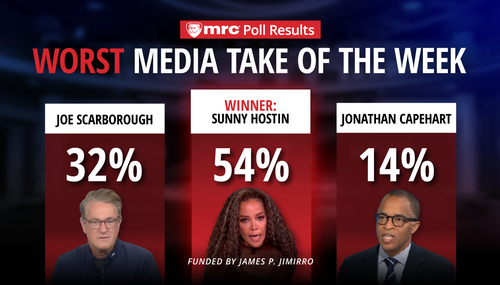 Asked by Tim Russert to name the biggest story of 2005, on Sunday’s Meet the Press Jon Meacham, Managing Editor of Newsweek, lamented how President Bush’s incompetence on Katrina and Iraq has disillusioned the new generation about the great “positive” things government can do. Meacham fretted that the new “generation coming of political consciousness, they're coming to consciousness when there are many, many questions about the competence of the government in Katrina, the competence of the government in terms of intelligence.” But, he rued, “there's not the good part which happened in the '60s. There's not a civil rights movement. There's not a race to the moon, where things are, show what government can do in a positive way.” Meacham zeroes in on Bush as he bemoaned how Bush’s conduct “has raised a lot of questions about fundamental competence of the government, both abroad and at home, whether it's in Baghdad or in New Orleans." A conservative might see that as an unintended positive development.
Asked by Tim Russert to name the biggest story of 2005, on Sunday’s Meet the Press Jon Meacham, Managing Editor of Newsweek, lamented how President Bush’s incompetence on Katrina and Iraq has disillusioned the new generation about the great “positive” things government can do. Meacham fretted that the new “generation coming of political consciousness, they're coming to consciousness when there are many, many questions about the competence of the government in Katrina, the competence of the government in terms of intelligence.” But, he rued, “there's not the good part which happened in the '60s. There's not a civil rights movement. There's not a race to the moon, where things are, show what government can do in a positive way.” Meacham zeroes in on Bush as he bemoaned how Bush’s conduct “has raised a lot of questions about fundamental competence of the government, both abroad and at home, whether it's in Baghdad or in New Orleans." A conservative might see that as an unintended positive development.Meacham was joined on the roundtable by New York Times columnist William Safire, Washington Post columnist Eugene Robinson and NBC’s favorite historian, the left-wing Doris Kearns Goodwin, who chafed over how President George W. Bush has “taken the negative parts of his father about raising no taxes.” (Transcript excerpts follow.)
(Meacham won the “Madness of King George Award for Bush Bashing" in the MRC’s "Best Notable Quotables of 2005: The Eighteenth Annual Awards for the Year's Worst Reporting," for this shot on Imus in the Morning following Bush’s criticism of Roosevelt’s Yalta deal with Stalin on post-war Europe: “It’s like he [President Bush] stuck a broomstick in his [FDR’s] wheelchair wheels.")
Back to Meet the Press, Jon Meacham, on what he considers the biggest story of 2005:
“I think Iraq, and I think, somewhat to Bill's [Safire] point about an angle on it, is the issue of trust and the questions about the pre-war intelligence, the questions about the conduct of the war. In an interesting way to me, for this generation coming of political consciousness, they're coming to consciousness when there are many, many questions about the competence of the government in Katrina, the competence of the government in terms of intelligence. But there's not the good part which happened in the '60s. There's not a civil rights movement. There's not a race to the moon, where things are, show what government can do in a positive way, and I think this has been a difficult year for government as an idea. And I think that the President, who has chosen to project power in this way, to use Richard Haas' phrase, as a 'war of choice,’ he has done so in a way that now has raised a lot of questions about fundamental competence of the government, both abroad and at home, whether it's in Baghdad or in New Orleans.”
Much later in the show, Doris Kearns Goodwin, on what books people should read in 2006:
“Well, you know, oddly I just re-read Mr. Bush Sr.'s All the Best, which is his letters and diaries, and if the junior would read that, it talks about bipartisanship, it talks about shmoozing with the Congressmen, being much more open and being willing to just listen to what people are saying. I think he's taken the negative parts of his father about raising no taxes and not using the political capital. There's a lot of positive pieces in that classy father that are in that book.”
I have no idea what she meant by “not using the political capital,” but that’s what she said.
MSNBC.com’s posted transcript of the January 1 Meet the Press. (I made a couple of corrections in the portions above after comparing the transcript to the video of what aired.)




